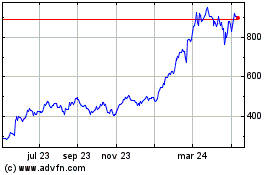Executives Say $1 Billion for AI Research Isn't Enough
10 Septiembre 2019 - 5:47PM
Noticias Dow Jones
By Sara Castellanos
The announcement Tuesday of a nearly $1 billion federal
commitment toward artificial-intelligence research drew a mixed
response from business leaders who said the U.S. needs to do more
to maintain a competitive edge in AI.
Government agencies requested $973.5 million in nondefense AI
research spending for the fiscal year ending in September 2020. It
is the first time the federal government has calculated
agency-specific requests for spending on artificial intelligence.
AI spending for the Defense Department is classified.
Trump administration officials said they believe the total
reflects their commitment to maintaining and strengthening U.S.
leadership in AI. They also suggested their figures are more
transparent than China's AI investment numbers, which have prompted
worry in the U.S.
"Too often, the conversation focuses almost exclusively not on
where America is dominant, but instead on the alleged disparity in
government spending on AI R&D," Michael Kratsios, the U.S.
chief technology officer, said at a Washington panel event. "In
American AI R&D budgets, you won't find aspirational
expenditures or cryptic funding mechanisms."
But representatives from chip makers Intel Corp. and Nvidia
Corp., who were participating in the event, said the U.S. needed to
invest even more in AI. They also criticized federal officials for
not doing enough to come up with regulations governing data
protection and privacy, which some experts argue could spur private
investment in AI because the technology relies heavily on data.
"We're nowhere near where we should be" in government funding
for AI research, said Jackie Medecki, director and managing
attorney of Intel's U.S. AI and health-care policy division.
She called for federal privacy regulations clarifying how data
could be used. Currently, various state laws govern data privacy.
Ms. Medecki says that "patchwork" of regulations makes it difficult
to use AI. Having a national, comprehensive privacy law would
create more trust in AI by creating guardrails around the use of
people's data, she said. "A big miss for the U.S. is the failure to
have robust national privacy legislation," she said.
The White House plan calls for government agencies to develop
ethical AI systems and shared public data sets for AI training, and
seeks to improve how humans and machines interact, among many other
initiatives.
In February, President Trump signed an executive order to focus
on AI initiatives that included investing in research and
development and setting AI governance standards. Various other
countries have developed national strategies to promote the use and
development of AI, including China, Finland, Canada, France and
Germany. In 2017, Beijing announced plans to lead the world in AI
by 2030.
Ms. Medecki said the U.S. government should follow the example
of countries like Estonia, which developed a formal strategy for
how the technology should be used, including AI's ethical
implications.
Intel this year released a set of recommendations for the U.S.
government on AI. They included suggestions to mandate the adoption
of AI systems throughout the government and to adopt federal
privacy legislation.
"I think there is a real government role, and frankly a little
bit of failure here...to show examples of AI and how AI can help
us," Ms. Medecki said.
China is adopting AI at a faster rate than the U.S. and the
European Union, possibly because Chinese companies and citizens
understand the value of AI, according to an August report released
by the Center for Data Innovation, a nonpartisan research
institute. Tuesday's event was held at the National Press Club and
hosted by the Center for Data Innovation.
The U.S. government should do more to maintain the country's
status as a leader in AI, said Anthony Robbins, Nvidia's vice
president for the North American public sector. Washington needs to
boost its AI training programs and figure out a way to compete for
AI talent with startups and technology companies that pay more, he
said.
"A billion dollars is certainly a great thing and certainly
interesting, but it's not nearly enough," he said.
--John D. McKinnon contributed to this article.
Write to Sara Castellanos at sara.castellanos@wsj.com
(END) Dow Jones Newswires
September 10, 2019 18:32 ET (22:32 GMT)
Copyright (c) 2019 Dow Jones & Company, Inc.
NVIDIA (NASDAQ:NVDA)
Gráfica de Acción Histórica
De Mar 2024 a Abr 2024

NVIDIA (NASDAQ:NVDA)
Gráfica de Acción Histórica
De Abr 2023 a Abr 2024
